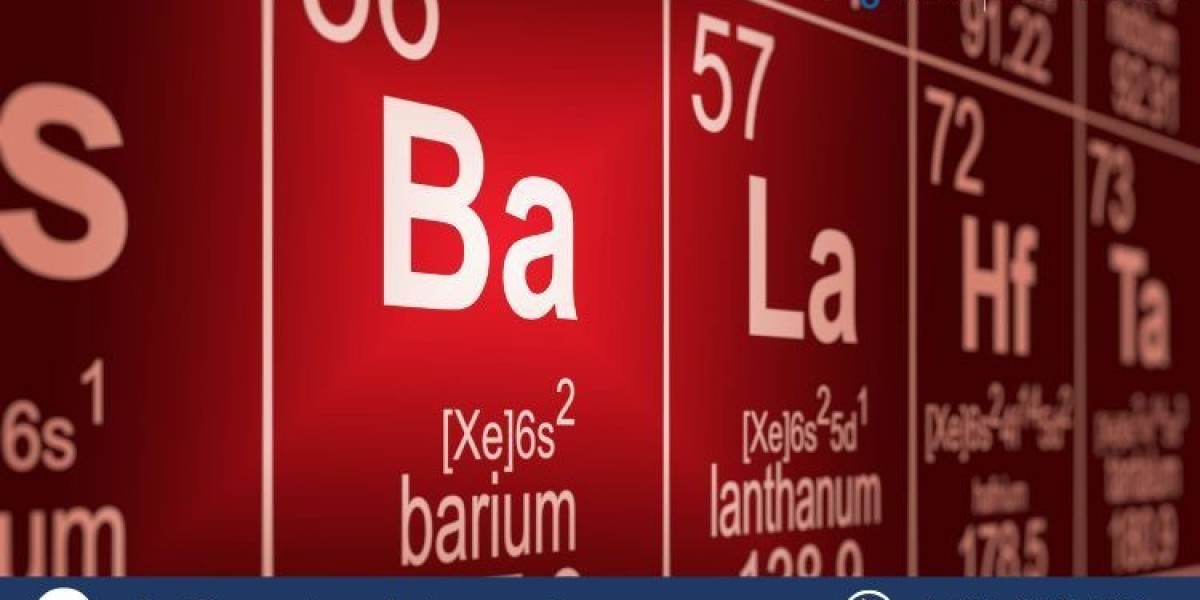The global Barium Titanate Market Size is anticipated to experience substantial growth, projected to expand at a CAGR of 6% from 2024 to 2032. As an inorganic compound with exceptional dielectric properties, barium titanate (BaTiO₃) plays a pivotal role in the development of multilayer ceramic capacitors (MLCCs), electromechanical transducers, and thermistors, making it indispensable in the electronics, automotive, and renewable energy industries. The rising demand for electric vehicles (EVs) and renewable energy storage solutions is anticipated to be a primary growth driver, given the need for high-performance energy storage systems.
Key Benefits of Barium Titanate
- High Dielectric Constant: Barium titanate is highly valued for its significant dielectric properties, which make it ideal for energy storage and electronic applications.
- Thermal Stability: Barium titanates stability at various temperature ranges enhances its use in thermistors and other electronic components.
- Energy Efficiency: The material is used in energy storage applications due to its high capacitance, which supports efficient power delivery in various industries, especially in electronics and EVs.
- Durability: Known for its resistance to mechanical stress and degradation, barium titanate is highly suitable for long-lasting applications in various industries.
- Environmental Impact: Compared to alternative materials, barium titanate has a lower environmental footprint due to its reusability and efficiency.
Key Industry Developments
- Technological Advancements in MLCCs: Ongoing research is enhancing barium titanate's potential for use in high-density MLCCs, vital for miniaturized devices, electric vehicles, and IoT products.
- Electric Vehicle Boom: Growing demand for high-performance batteries and capacitors in the EV sector is promoting further research into advanced barium titanate formulations.
- Investment in Renewable Energy Storage: As countries shift towards renewable energy, barium titanate's role in energy storage solutions, especially in solar and wind energy systems, is intensifying.
- Emerging 5G and IoT Applications: With the growth of 5G technology and IoT, there is increasing need for barium titanate-based components, especially in miniaturized electronic devices.
- Regional Expansion: Asia-Pacific, specifically China, Japan, and South Korea, is witnessing notable expansion in production capacities, with significant investments aimed at catering to the electronics industry.
Driving Factors
- EV Market Growth: The shift to EVs globally is a major driver, as barium titanate is essential in producing the high-efficiency capacitors and storage units required for these vehicles.
- Increased Demand in Electronics: The rising demand for smaller, more efficient electronic devices is driving the need for advanced capacitors and thermistors made with barium titanate.
- Governmental Support for Renewable Energy: Many governments are investing in renewable energy projects, where barium titanate components are integral for energy storage solutions.
- RD Investments: Numerous companies are investing heavily in research and development to enhance the properties and applications of barium titanate, improving its performance in electronics and automotive industries.
Restraining Factors
- High Production Costs: The costs associated with barium titanate production, particularly high-purity grades, can be a limiting factor for new market entrants.
- Competition from Alternatives: Alternative materials such as aluminum electrolytic capacitors and other ceramic compounds pose competitive threats, as they can offer similar performance in specific applications.
- Regulatory and Environmental Challenges: As regulatory pressures increase, particularly in Europe and North America, manufacturers may face challenges in maintaining compliance, especially regarding environmental impact.
Market Segmentation
By Application
- Capacitors: Predominantly used in MLCCs, which are essential in electronic circuits for devices like smartphones, laptops, and televisions.
- Thermistors: Barium titanate-based thermistors are widely used for temperature measurement and control across various industries.
- Transducers: Used in transducers for applications in healthcare, automotive, and industrial sectors.
- Others: Includes applications in batteries, energy storage systems, and renewable energy technologies.
By End-Use Industry
- Automotive: High demand in EV batteries and advanced driver-assistance systems (ADAS).
- Consumer Electronics: Essential in products like smartphones, computers, and IoT devices.
- Healthcare: Used in medical devices, especially those requiring precise electronic components.
- Energy and Power: High relevance in renewable energy storage systems and energy-efficient power delivery systems.
By Region
- North America: Growing demand in electronics and renewable energy industries.
- Europe: Emphasis on EV production and stringent environmental regulations.
- Asia-Pacific: Major hub due to high electronic manufacturing activity, with countries like China, Japan, and South Korea leading in production.
- Rest of the World: Moderate demand in emerging economies focusing on energy storage solutions.
Market Outlook
With a projected CAGR of 6%, the global barium titanate market is poised for considerable growth from 2024 to 2032. This trajectory is supported by increased EV demand, innovations in consumer electronics, and growing renewable energy projects. Expanding production capacities in Asia-Pacific and a rising number of partnerships and acquisitions in the sector will likely enhance global supply chain resilience. The automotive industry, specifically the EV segment, is expected to generate a high demand for barium titanate, emphasizing the need for new and efficient energy storage solutions.
Market Trends
- Shift Towards Nanostructured Barium Titanate: Research into nanostructured barium titanate is opening up potential applications in high-energy density storage devices.
- Integration in 5G Technology: As 5G technology gains ground, barium titanate-based components are anticipated to be crucial in supporting higher frequencies in miniaturized electronics.
- Growth in Healthcare Applications: Advanced medical equipment, such as ultrasound machines, increasingly relies on barium titanate for its sensitivity and performance.
Regional Analysis/Insights
- Asia-Pacific: Holds the largest share due to robust electronics manufacturing infrastructure, particularly in China, Japan, and South Korea.
- North America: Growing demand in EV and renewable energy sectors, coupled with government incentives, boosts market expansion.
- Europe: EV growth and regulatory focus on eco-friendly materials are strong drivers for barium titanate adoption.
Top Impacting Factors
- Growth in EV Demand: Increasing EV adoption is directly impacting demand for advanced capacitors, where barium titanate plays a crucial role.
- Technological Innovations: Innovations in material composition and manufacturing processes enhance product performance, opening up new applications.
- Environmental Regulations: Growing regulatory pressures for sustainable materials and practices could impact the market positively by promoting recyclable materials.
Target Audience
- Automotive Manufacturers: Companies developing EVs and ADAS systems.
- Consumer Electronics Companies: Key players in producing high-efficiency electronics.
- Energy Storage Solutions Providers: Firms specializing in renewable energy storage.
- Healthcare Device Manufacturers: Companies using high-precision components for sensitive applications.
Major Key Players
- KCM Corporation
- Ferro Corporation
- Fuji Titanium Industry Co., Ltd.
- Nippon Chemical Industrial CO., LTD.
- Shandong Sinocera Functional Material Co., Ltd
- Others
Opportunities
- Expansion in EV and Renewable Energy Markets: As these markets expand, new applications and increased demand for barium titanate are expected.
- Advanced Research in Nanomaterials: Further research into nanostructured barium titanate could revolutionize its applications in energy storage.
- Emerging Markets: Growing adoption of consumer electronics and green energy solutions in emerging economies creates new market opportunities.
Challenges
- High Cost of Production: Reducing production costs, particularly for high-purity barium titanate, remains a challenge.
- Supply Chain Vulnerabilities: Dependency on raw material availability and geopolitical factors can lead to supply chain disruptions.
- Regulatory Compliance: Adhering to environmental regulations while maintaining production efficiency can be complex.








